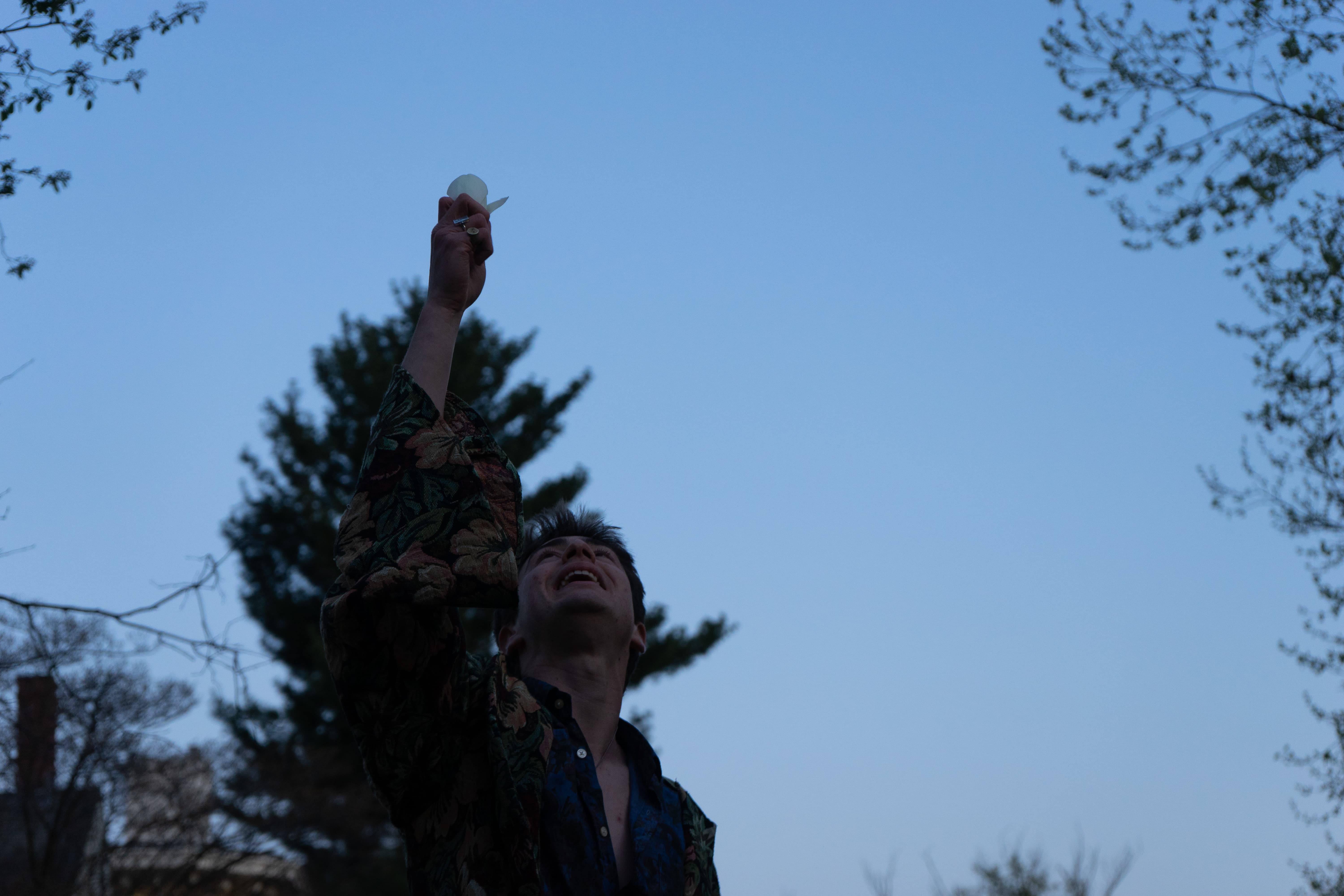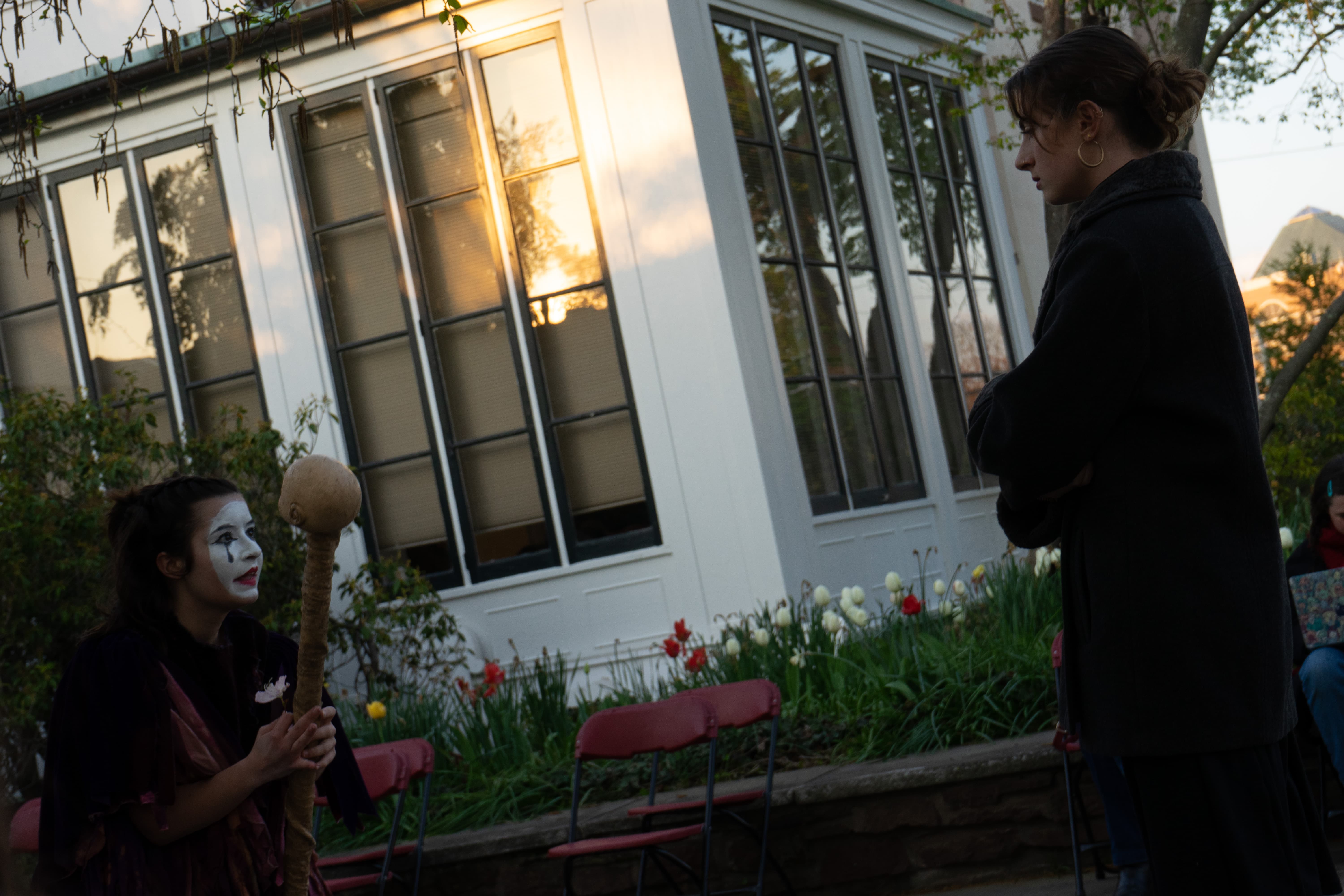
c/o Miller Ontiveros
In an outdoor adaption of “Twelfth Night, Or What You Will,” directed by Kieran Gettel-Gilmartin ’25, one of Shakespeare’s greatest plays comes to life in the courtyard of the Digital Design Studio. Produced by Spike Tape and performed at 6:30 p.m. on Thursday, April 27, Friday, April 28, and Saturday, April 29, Gettel-Gilmartin’s production of “Twelfth Night” draws inspiration from Shakespeare in the park and works to combine a number of complex elements: queer identity, music, and the tension between the medieval and the modern.
“This is the biggest puzzle I’ve ever tried to solve, and I’m still fiddling with it,” Gettel-Gilmartin said.
In short, the play follows Viola (Miranda Derossi ’23) and Sebastian (Max Morfoot ’25), twins separated at birth. Viola disguises herself as Cesario and goes to work for the Duke Orsino (Stanley Ackerman ’24) before falling in love with him. Orsino, however, pursues the affections of Olivia (Paige Meril ’26) by sending Cesario to woo her, and Olivia then falls for Cesario. In the messiest of love triangles, Sebastian’s arrival further complicates the situation and results in the classic Shakespearean case of mistaken identity, heartache, and, like most comedies of the era, a marriage. Sebastian and Olivia end up together, and after Viola reveals her true identity, Orsino asks for her hand.
The pointed yet emotional interpretation of each word from the production’s actors was beautifully juxtaposed with the complicated plot points. The embodiments of the characters remind us of someone we kind of know; Olivia is the jaded upper-east sider whose only problem is that she is in the closet; Sir Toby (Cole Lyman ’26) is an eccentric, alcoholic bi-con; and Malvolio (Max O’Hare ’23) is that one coworker who takes his job way too seriously, who you can’t help but pity for his misplaced earnestness. Yet, these character depictions never slipped into character tropes. Instead, each character was crafted carefully according to their use of language and specific relation to the characters around them. The production managed to successfully capture the universalizability of Shakespeare. We can only recognize these characters so well within a modern context because love—particularly queer love—and the comedy of misunderstanding haven’t changed all that much since Shakespeare’s time. This production offered audiences a sense of humanity, and thus, was not bogged down by language. Instead, it was careful to interpret the play’s language with its characters and plot in mind, rather than the original historical and societal context.
This production made my untrained ear understand the Shakespearean language. It certainly felt somewhat of the modern day, like watching a rom-com, complimented by a good dose of that penetrating, Shakespearean portrayal of humanity. The delivery and tone of the language is carefully delivered to make the comedy as shocking as the emotion is relatable. The serenity of the outdoor setting combined with the constant dynamism of plot and acting, as well as the oddities of the characterization, drew us into another world that reflected our own but was more strange and confusing to the Jacobean.
Although I am not a “Twelfth Night” expert myself, I assume that this production’s interpretation of language was just as impressive as its entertainment value, considering the fact that Associate Professor of English Harris Friedberg, a notable lover and teacher of Shakespeare, expressed finding the show both wonderful and inventive. This confirmed my feeling that the production overcame the worries that Gettel-Gilmartin initially had with putting on a Shakespeare show.
“The main issue with performing Shakespeare nowadays [is that] you have to find a way to bridge the modern acting sensibilities and the older, grander language,” Gettel-Gilmartin said.
As a viewer who sometimes feels condescended to when Shakespeare is modernized, I really appreciated that this production did not expressly modernize, but simply stripped down the script to highlight the quirks and subtlties of the language, and then built up around that. The blatantly queer narrative in “Twelfth Night” was by no means forced in this production, and it did not gloss over the dialogue’s undeniably flirtatious undertones. Furthermore, the portrayal of queer love stories felt all the more real in this production since the production was not confined to the rigidity of heteronormativity and marital expectations. Queer entanglements were accentuated and didn’t feel overshadowed by the play’s heterosexual narratives. The queer moments were unapologetically affectionate, while the heterosexual narratives adopted a sense of ridiculous falsity.
The only time we saw heterosexual affection was when Olivia and Sebastian united at the end of the play. However, this production did not stray from highlighting character nuances so that the heterosexual narratives aired on the side of comedic misfortune. It did not bask in the gratuitous, forced conclusion of their marriage, but rather in the pair’s comical lack of sexual chemistry (most likely due to the character’s sexualities). Following their engagement, Olivia latched to Viola like a puppy while Sebastian shared a tender moment in the corner, offering audiences another example of detailed and pointed character portrayal. Ultimately, this production refused to pursue the easy route, the heteronormative way out, and instead created comedy within the bounds of queer love, rather than satirizing it from the outside.
Gettel-Gilmartin said that the production’s success was the collective result of contributions from the many members involved in the production.
“What has helped is just wonderful, wonderful actors,” Gettel-Gilmartin said. “I really adore my cast, and I think they’re so talented, and they have a way of bringing such a freshness to it, but still can keep it rooted in the old, flowery language.”
As an audience member, I felt that this really shone through. Every character was pointedly crafted as a whole, and every line was delivered with genuine feeling and the shrewd sardonicism that Shakespeare imbues in each of his characters. These roles are some of Shakespeare’s hardest, requiring actors to capture the gravity of the play’s romantic plot line while maintaining the light and foolish elements of the comedy. Olivia, for example, exerts her feminine power over the other characters, yet is the hardest to fall in love with, a juxtaposition that is wonderfully demonstrated by Merril. Though Sir Andrew (Lucas Donat ’26), Maria (Sara Bateman ’24), and Toby are often considered integral parts of the comedy’s subplot, the actors do not fail to convey the genuineness that comes out of these characters. As an audience member, I felt the hilarity at the very believable ridiculousness of these characters, as well as the deep emotion of the necessary ridiculousness that comes with navigating life and love. You will come to understand by the end of viewing this production, or specifically, the final minutes of the production, why love is worth the embarrassment.

c/o Miller Ontiveros
“Illyria [where “Twelfth Night” is set,] is where Estonia is now, so I kind of wanted to have this bridging between the dream world and a slavic club, where the body is emphasized,” Gettel-Gilmartin said.
Alongside compelling performances, the set itself does enough to draw us into a dream world, and at times, a Slavic night club. Along with adding to the sense of accessibility and unbounded creativity of this production, the outside setting also provided a certain verisimilitude. The production took place in a courtyard, so it felt like we happened to be innocent people sitting in the court, observing the action as it was taking place. The characters flirt, party, and cause ruckus in this courtyard, as if it was Shakespeare’s intended location. The space is utilized in a way that feels spontaneous and as such that the actors did not seem trapped on a stage. Furthermore, our proximity to the actors made the drama of their physicality all the more exciting. For example, the actors didn’t shy from moving the drama in and around the audience, making us feel like we are part of this court’s drama.
The seamless transitions between scenes often signified vast tonal shifts and were crucial to this production’s execution, keeping the audience engaged and effectively portrayed the plot’s movement. “Twelfth Night” is also a play punctuated with musical verse, with two live guitarists, Vahn Kessler ’25 and Nate Uberuaga ’25, delivering an almost cinematic soundtrack—but not without archaic twists—that was composed specifically for this production. The music conveyed a sense of magic and beauty but was also used in between dialogue to create an almost montage-like feeling, providing fluidity in a play that could easily feel choppy.
The wonderful thing about this production is that it was not trying to do anything except have fun. It was polished and intricate, had aspects of modernity and Jacobeanism, and was subtle and hyperbolic. Still, these all felt like outcomes that sprung from the script and were expertly combined with creativity and joy. In my opinion, Shakespeare was never intended to be an austere and choreographed presentation of language, nor an entirely symbolic, and forcedly subjective one. The intelligent creativity of this production hits the mark exactly.
As of publication of this article, the production is sold out, but I encourage you to show up early and see if there are empty seats. As it’s an outdoor production, Gettel-Gilmartin urges anyone and everyone to show up, in the spirit of populous entertainment. I advise you to bundle up warm, because the sun will sink below the horizon during the production, leaving an effect both beautiful and rather chilling.
Charlotte Seal can be reached at cseal@wesleyan.edu.
Comments are closed